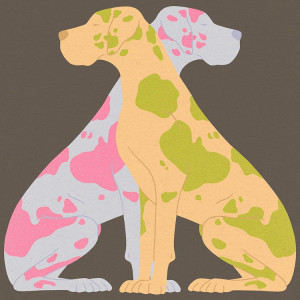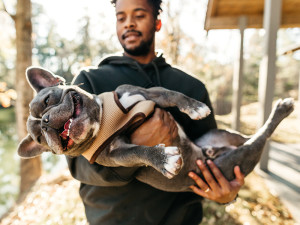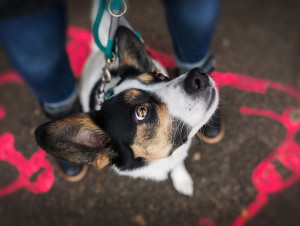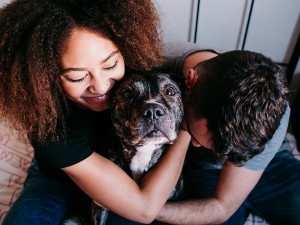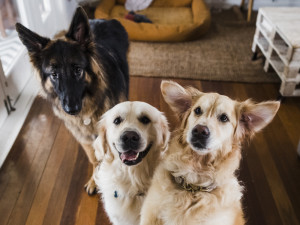You Raise Your Dog the Way Your Parents Raised You, New Study Finds
One more thing to talk about with your therapist.
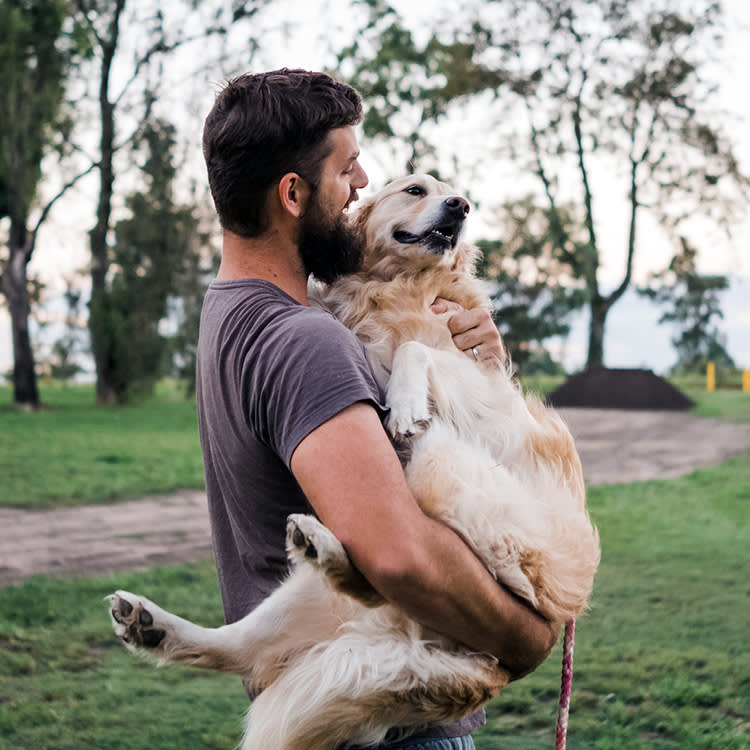
Share Article
I’m embarrassed to admit that my sons were three and four-and a-half-years old before I fully processed that I had given birth to humans and not canines. I’m sure some people figured this out sooner, but the important thing is I eventually arrived at the proper understanding.
The truth is I had years of experience raising dogs before I had human children, so I ended up treating my babies and toddlers more like puppies. Some of the other mommies at the park seemed to think it was a bit odd, but to my dog-behaviorist mind, it was totally normal. I smooched and whoop-whooped to get their attention. When my son first started walking instead of crawling, I said he was “on his hind legs.” I used the terms “house training” and “toilet training” interchangeably.
Despite the embarrassment of these errors — more embarrassing for friends and family than for me, truth be told — it turns out I’m not alone in realizing human parenting and dog parenting are mixed up (and similar!) in all kinds of ways.
It's true that the way I train my dogs and interact with them is more interchangeable with the way I teach and interact with my kids than may be true for the average parent. But I know I’m not the only one. Teach my kids to heel (but call it “stick close”) for safety when in the street? Check. Teach my kids to stay because sometimes they needed to remain in one spot for a bit for whatever reason? Check. And it goes both ways.

Teach dogs to place a paw on a doormat so they are contained in one place just like I taught my kids to put their hand on the car in parking lots to keep them where I want them to be? Check. Offer dogs loving reassurance and a spot in the bed during a thunderstorm, just as I offered my kids loving reassurance after a bad dream? Check.
Turns out, we raise our dogs similarly to how we were raised.
Luckily for me, science has saved the day — allowing me to save face — in the form of a new study that matches the feeling so many of us have: Our dogs are our kids, and we treat them as such (apparently, in my case, it’s also vice verse).
A study in the journal Animalsopens in new tab titled “Intergenerational Transmission of Human Parenting Styles to Human-Dog Relationships” shows that we tend to parent our dogs like we were parented as children. It’s certainly well known that we tend to carry the lessons of parenthood from our childhood into our own parenting styles as we raise our children, so why should we expect anything different when it comes to raising our dogs?
Parenting styles with either humans or dogs are based on how parents interact with those in their care. It’s important to note here, though, that this study is not saying that your parents’ parenting style will directly inform yoursopens in new tab. I personally brought the parenting style I was raised with into my own parenting choices. My parents used lots of communication, an emphasis on learning, and raised me in an environment where kids are celebrated for who they are.
If you read that and thought, Hey, I don’t parent my dog anything like I was parented, that’s valid. This study is simply saying that we tend to be informed by what we know. Sometimes, that may actually mean doing things differently on purpose, and that’s cool. Regardless of how you were brought up, no one loves your pup more than you do, which means you’ll always do right by them and treat them like the deserving little baby they are.
Yes, there are names for parenting styles.
When it comes to parenting, there are two main types of interaction: demandingness and responsiveness. The main parenting styles are described based on the levels of those two factors. Demandingness is about control, expectations, and monitoring of behavior by parents. Responsiveness concerns emotional warmth, recognize the needs of another, and providing support.
The four parenting styles are best described by high or low levels of each of the two parameters: Authoritarian (high demandingness, low responsiveness), authoritative (high demandingness, high responsiveness), permissive (low demandingness, high responsiveness), and uninvolved/neglectful (low demandingness, low responsiveness).
Authoritarian parenting:
These parenting styles affect how children develop. Authoritarian parenting frequently leads to children who are good at following rules but fear punishment. They may be prone to rebellion, lack social skills, and have trouble making their own decisions as adults.
Authoritative parenting:
Authoritative parenting frequently leads to children who have close relationships with their parents and are curious, confident, friendly, and good at regulating their own emotions.
Permissive parenting:
Permissive parenting tends to lead to children who feel good about themselves and have good social skills but are likely to be demanding, impulsive, and may have trouble controlling their own emotions.
Uninvolved/neglectful parenting
Uninvolved/neglectful parents are likely to have children who have trouble maintaining social relationships, struggle to regulate their emotions, have poor coping skills, and have a tendency to overeat.
The effects of pet parenting styles are not yet as well understood because not as much is known about how our behavior with our dogs influences how they develop and who they become. We do know from this study that pet parents who had permissive parents tend to adopt that style with their dogs. Does that mean their dogs are likely to develop in similar ways? It seems so.
How do we develop parenting styles?
Research about pet parenting styles shows that the way we interact with our dogs influences their behavior and their health, but we still don’t have a thorough understanding of how people develop a particular style of parenting toward their pets.
More research is needed to fully understand details about pet parenting styles and the way they impact our dogs, ourselves, and our relationship. Understanding how our pasts influence our futures can make our relationships with dogs better and improve the wellbeing of both pups and their parents.
As the authors of the recent paper write, “Additionally, by recognizing the impact of parenting styles on dog-directed behaviors, our findings offer practical implications for dog training and behavior modification programs, emphasizing the need for tailored approaches that account for individuals’ upbringing and orientations toward non-human animals. Such insights can ultimately contribute to more effective strategies for enhancing welfare and for fostering positive relationships between humans and dogs in real-world settings.”
All these similarities between parenting humans and parenting dogs explains why it was so natural to treat my sons like puppies, but I’m not sure how they feel about that. I do know that when they were little, they appreciated how unbothered I was about their desire to drink water out of a dog bowl, though (#parentinggoals).

Karen B. London, PhD, CAAB, CPDT-KA
Karen B. London is a certified applied animal behaviorist (CAAB) and certified professional dog trainer (CPDT) who specializes in working with dogs with serious behavioral issues, including aggression. She has written for a variety of magazines including The Bark, Clean Run, and the APDT Chronicle of the Dog, and has published in scientific journals including Behavioral Ecology and Sociobiology, Ethology, Ecology, and Evolution, the Journal of Insect Behavior, and Insectes Sociaux. She is the author of seven books about dog training and canine behavior, including the forthcoming My Dog's Mystery Adventure: And Other Stories From a Canine Behaviorist and Dog Trainer.
Related articles
![Dog trainer reinforcing good behavior with a young boxer dog on a dog training field]()
These Reinforcement Techniques in Dog Training Will Make Rules Fun for Both of You
Offering fewer treats can actually be a good thing.
![Dog on leash sitting on a colorful street and looking attentive at their pet parent]()
How to Get Your Dog to Pay Attention to You
Here are some simple steps to pry your pup away from that one spot in the yard they’re obsessed with.
![Couple hugs their merle Boxer]()
How to Improve Your Relationship with Your Dog
Animal behaviorist Dr. Karen B. London on how to strengthen your pet-parent bond.
![Boston terrier being stubborn]()
Dog Training — DIY or Hire a Pro?
When it’s time to call in reinforcements.
![3 dogs posed together in a house]()
Does Your Dog Have a Unique Personality?
Yep, research says your dog is as special and perfect as you tell them they are.

